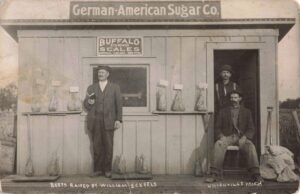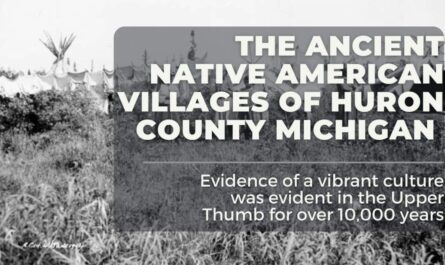This real photo postcard captures a moment from the early 1900s at a sugar beet weighing station operated by the German-American Sugar Company in Unionville, Michigan. Prominently displayed are labeled sugar beets raised by local farmer William Eckfeld, lined up for inspection on a wooden shelf outside the scale house. A company clerk holding a ledger stands ready to log weights using a Buffalo Standard Scale—an essential tool for determining pay by the ton. The two men near the doorway, dressed in typical farm laborer attire, reflect the gritty, hands-on work behind Michigan’s once-thriving sugar beet industry.
At the time, Tuscola County and surrounding Thumb-region towns like Unionville, Vassar, and Sebewaing were deeply involved in sugar beet farming, driven by favorable soil, rail access, and the rise of beet processing facilities. The German-American Sugar Company, later absorbed into Michigan Sugar, contracted with area farmers to supply beets for processing. Images like this were often used for promotional purposes or crop contests, documenting the yield and quality of local produce. Today, the photo stands as a clear window into the agricultural and economic forces that shaped early 20th-century rural Michigan.
Discover more from Thumbwind
Subscribe to get the latest posts sent to your email.




